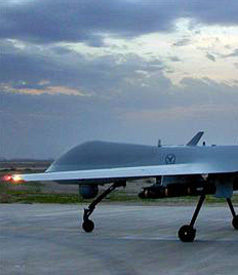
No Let-Up in US Drone War in Pakistan
Dan De Luce - Agence France-Presse
Washington - The expanding US drone war against Al-Qaeda may be disrupting the terror network's operations but the lethal bombing raids carry risks for Washington and its ally Pakistan.
The head of the CIA has defended the attacks in Pakistan by unmanned aircraft as "the only game in town" when it comes to targeting Al-Qaeda and its allies. US officials credit the bombing raids with knocking off key figures in the terror network.

At Balad Air Base in Iraq, an unmanned Predator drone leaves the ground. (Photo: Charles J. Hanley / AP)
Yet an unknown number of civilians have died in the bombing war, possibly as many as 700, according to the Pakistani press.
The strikes are deeply unpopular in Pakistan, with skeptics warning the tactic could backfire by sowing public anger while failing to defeat resilient extremist networks.
"The more there are unilateral targeted strikes in Pakistan, the higher political costs for the US, and for Pakistan, for allowing them to happen," Seth Jones, an analyst at the RAND Corporation, told AFP.
Islamabad publicly criticizes the targeted assassinations but quietly cooperates with the Americans, Jones said, with the government allowing the use of an air base on Pakistani soil - a detail US Senator Dianne Feinstein accidentally let slip at a hearing.
The drones, armed with lethal missiles and controlled by a "pilot" using a joystick at bases in Nevada and elsewhere, have become America's weapon of choice in the fight against Al-Qaeda.
With virtually no public debate in the United States, the pace of the bombing raids has steadily increased, starting last summer during ex-president George W. Bush's final months in office and now under President Barack Obama.
Equipped with infrared cameras, precision-guided bombs and Hellfire missiles, Predator and Reaper aircraft have carried out strikes in Pakistan at a rate of about once a week since Obama took office in January, experts and Pakistani media say.
The spike in drone attacks in Pakistan has come even as US military officers pursue new tactics in the war in neighboring Afghanistan to try to minimize civilian casualties and scale back air power where possible.
Concerned about Al-Qaeda regrouping in Pakistan's northwest, the United States began relying more on the drones after covert operations by US special forces triggered an angry reaction among Pakistanis, analysts said.
And ever since the former Bush administration reportedly stopped notifying Pakistani officials before each attack, a process that could take hours, the strikes can be carried out quickly.
In a rare public admission of the drone war, Leon Panetta, the new director of the Central Intelligence Agency, recently called the bombing "very effective."
"It is very precise, it's very limited in terms of collateral damage and very frankly, it's the only game in town in terms of confronting and trying to disrupt the Al-Qaeda leadership," Panetta said in May.
Even if the strikes are as accurate as the CIA chief claims, experts question the practical effect of the raids without ground troops, aid and other measures to back them up.
"Breaking the power of extremists means removing their power to intimidate - something strikes cannot do," said David Kilcullen, former adviser to the US commander overseeing the wars in Afghanistan and Iraq, General David Petraeus.
Similar US drone strikes in Somalia in 2005-6 killed Islamist militant leaders but caused public outrage and helped the hardliners rally support, Kilcullen and former US Army officer Andrew Exum wrote in a May commentary.
"While violent extremists may be unpopular, for a frightened population they seem less ominous than a faceless enemy that wages war from afar and often kills more civilians than militants," they wrote.
The authors argued drone attacks are a tactic and not a strategy, and reflect a tendency in Washington to overstate the importance of targeting individual leaders in Al-Qaeda and associated groups.
While the drone war has ramped up, with reportedly 48 such strikes since August 2008, the threat posed by Al-Qaeda and other extremists continues unabated, analysts said.
"We are now creating a very similar problem to what the Israelis face in Gaza," said Peter Singer, author of "Wired for War."
"They?ve gotten very good at killing Hamas leaders. They have in no way shape or form succeeded in preventing a 12-year-old in joining Hamas," he said.
